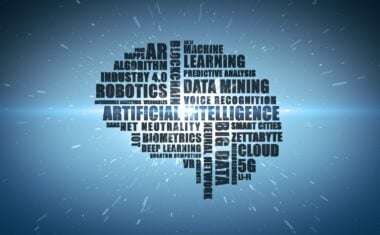If there’s one company where a data scientist can work on products and services that are synonymous with innovation and reach billions of people worldwide, it’s Apple.
With one of the world’s most revered hardware divisions and software that spans digital marketplaces such as Apple Music and Apple Arcade; entertainment platforms such as Apple TV and Podcasts; operating systems such as iOS and OS X; payment services like Apple Pay; and cloud computing services like iCloud—there are no shortage of opportunities for a data science specialist to flex their data gathering expertise.
Apple is considered one of the top workplaces for data scientists, offering both competitive salaries and benefits, and opportunities to shape products and services used by billions of people worldwide. Read on to find out how to get hired as a data scientist at Apple—and don’t forget to check out the guides below!
- Apple Data Scientist Interview: A Complete Guide
- Apple Data Scientist Internship: A Complete Guide
- How Much Does a Data Scientist at Apple Earn?
- Day-in-the-Life of a Data Scientist at Apple
What’s the work culture like at Apple?
Apple is known for its culture of secrecy—beyond keeping its hardware and software developments under wraps from the public, even employees are often in the dark when it comes to the company’s latest projects. But this doesn’t detract from the experience of working at Apple, according to current employees and former interns, who spoke of how rewarding it can be to work on products that end up being used by millions of people.
“It was super cool to get to be intimately involved in particular products before they came out, and to see the gritty details of past products, even some that never made it to market,” said former intern Nate Sharpe.
Current employees have also spoken of the company’s flexible work hours, generous compensation, and a long list of employee benefits.
Check out this page to learn more about the day-to-day of a data scientist at Apple.
What are the work benefits like at Apple?
In addition to generous compensation packages that rival those of Facebook, Amazon, Google, and Microsoft, Apple also boasts a Norma Foster-designed campus at its corporate headquarters in Cupertino and a slew of employee perks. Some of the benefits include:
- Complete coverage health insurance, including access to on-campus doctors, nurses, acupuncturists, and more
- 401K matching
- Charitable giving matching
- Discounts on Apple products and services
- Tuition and education reimbursement for professional development
- 16 weeks parental leave plus the option to work remotely
- Egg freezing and other fertility services
- Gym and wellness reimbursement
- A minimum of 12 days paid time off
- An annual Beer Bash party that has in the past featured performers such as Gwen Stefani and Idina Menzel
How much does a data scientist make at Apple?
The base salary for an Apple data scientist depends on years of experience, education, and location, and the total compensation can vary greatly depending on whether someone qualifies for an annual bonus or stock grants.
At the most entry-level of the range, Apple’s data science interns make around $7,000 a month, in addition to complimentary housing, a relocation stipend, and health benefits.
Data scientists who hold an undergraduate degree in computer science, statistics, mathematics, econometrics, economics, or a related field, and have at least a few years of experience under their belt can earn around $144,960, according to Glassdoor, in addition to bonuses and stock grants.
Senior data scientists who also hold master’s degrees or a Ph.D. in a related field, such as machine learning, can make around $179,700, in addition to bonuses and stock grants.
Get To Know Other Data Science Students
Sam Fisher
Data Science Engineer at Stratyfy
Bret Marshall
Software Engineer at Growers Edge
Garrick Chu
Contract Data Engineer at Meta
What’s the data scientist interview process like at Apple?
Data scientists who have interviewed with Apple report that the company seeks “full-stack” professionals, which means they want a data scientist who can do everything from large-scale data mining to insight synthesis, working with machine learning algorithms, system design, and software engineering. In order to determine whether qualified applicants check all the boxes, a recruiter will ask both technical and behavioral questions.
On the technical front, applicants can expect questions during both the phone screen and in-person interviews about A/B testing, developing analytical solutions and the methodologies behind them, full-stack data analysis, and how tools such as Hadoop, Teradata, and Spark can be deployed. Applicants should also expect to code in SQL or Python.
On the behavioral front, applicants can expect HR questions about why they want to work at Apple and how they perform under pressure. A recruiter will likely go over a candidate’s CV and ask about specific projects, internships, and past work experience to assess whether an applicant is a self-starter who excels at independent decision-making, collaboration, and has the communication and presentation skills to help Apple’s teams use data to identify and use key insights.
Successful candidates typically hold basic qualifications such as a bachelor’s degree in computer science, mathematics, statistics, or a related field, as well as a strong portfolio that shows experience working with the full data pipeline, effective communication of findings through data visualization tools, and creative problem-solving.
Check out this page to learn more about the interview process for data scientists at Apple.
What’s the internship process for data scientists at Apple?
Apple offers two kinds of internships: a conventional summer program, which runs for at least twelve weeks, and a full-time program that runs for at least six months during a regular semester. Former interns and current employees report that interns who do a good job often receive offers to join the company full-time once they graduate from their degree programs.
Skill requirements vary depending on the type of data analyst role and the team an intern joins. For example, most interns are expected to be enrolled in an undergraduate program and have some experience with data analysis and programming languages such as SQL or Python, but more advanced internships in areas such as machine learning and artificial intelligence require interns to be pursuing a master’s degree or Ph.D. in natural language processing, deep learning, statistical machine learning, or a related field.
The internship process begins with online application submissions, followed by a series of interviews. In addition to assessing whether an applicant has the technical chops to learn fast and contribute to Apple’s teams, the hiring manager also wants to see whether a candidate is a cultural fit.
“These interviewers aren’t just looking for someone who is very good in one specific field,” said former Apple intern Caitlin Connerney “They’re also looking for a coworker, a teammate, and a friend. For Apple, you need to be good in every applicable area.”
Check out this page to learn more about the internship process for data scientists at Apple.
What’s it like to work as a data scientist at Apple?
An Apple data scientist’s day-to-day is largely determined by the product or business teams they’re on. While all of Apple’s data scientists are skilled in SQL, Python, data processing, experiment design, predictive analytics, and operations research, and can collaborate with other teams, meet tight deadlines, and clearly communicate their findings to stakeholders, they each apply their skills to different areas of the business.
For example, a data scientist on the Siri Search team might focus on machine learning algorithms and artificial intelligence to improve Siri’s accuracy. A data scientist in Apple’s acoustics hardware division might craft experiments to quantify performance. And a data scientist working on improving customer experiences of Apple’s marketplaces might perform deep quantitative research of the App Store, the findings of which could influence the company’s business strategy.
Springboard can help you get hired as a data scientist at Apple
One of the key things that Sneha Runwal, former Springboard mentor and an Apple data scientist turned manager of machine learning, said she looks for in the data scientist hiring process is whether a candidate has completed a project end-to-end, because this shows her that they are familiar with the complete data pipeline, have had hands-on experience with a project, and can work independently.
Springboard’s Data Science Career Track prioritizes these very elements of the data science experience. In addition to teaching foundational data science skills such as data wrangling, inferential statistics, assessing data quality, understanding data pipelines, and workflows, and implementing machine learning algorithms, emphasis is placed on building real-world projects.
Springboard students will work on multiple small projects, plus two capstone projects, that will give them hands-on experience with coding in Python, coming up with questions they can ask of a data set, designing a project roadmap, querying data, rapid iteration, and model evaluation.
Companies are no longer just collecting data. They’re seeking to use it to outpace competitors, especially with the rise of AI and advanced analytics techniques. Between organizations and these techniques are the data scientists – the experts who crunch numbers and translate them into actionable strategies. The future, it seems, belongs to those who can decipher the story hidden within the data, making the role of data scientists more important than ever.
In this article, we’ll look at 13 careers in data science, analyzing the roles and responsibilities and how to land that specific job in the best way. Whether you’re more drawn out to the creative side or interested in the strategy planning part of data architecture, there’s a niche for you.
Is Data Science A Good Career?
Yes. Besides being a field that comes with competitive salaries, the demand for data scientists continues to increase as they have an enormous impact on their organizations. It’s an interdisciplinary field that keeps the work varied and interesting.
10 Data Science Careers To Consider
Whether you want to change careers or land your first job in the field, here are 13 of the most lucrative data science careers to consider.
Data Scientist
Data scientists represent the foundation of the data science department. At the core of their role is the ability to analyze and interpret complex digital data, such as usage statistics, sales figures, logistics, or market research – all depending on the field they operate in.
They combine their computer science, statistics, and mathematics expertise to process and model data, then interpret the outcomes to create actionable plans for companies.
General Requirements
A data scientist’s career starts with a solid mathematical foundation, whether it’s interpreting the results of an A/B test or optimizing a marketing campaign. Data scientists should have programming expertise (primarily in Python and R) and strong data manipulation skills.
Although a university degree is not always required beyond their on-the-job experience, data scientists need a bunch of data science courses and certifications that demonstrate their expertise and willingness to learn.
Average Salary
The average salary of a data scientist in the US is $156,363 per year.
Data Analyst
A data analyst explores the nitty-gritty of data to uncover patterns, trends, and insights that are not always immediately apparent. They collect, process, and perform statistical analysis on large datasets and translate numbers and data to inform business decisions.
A typical day in their life can involve using tools like Excel or SQL and more advanced reporting tools like Power BI or Tableau to create dashboards and reports or visualize data for stakeholders. With that in mind, they have a unique skill set that allows them to act as a bridge between an organization’s technical and business sides.
General Requirements
To become a data analyst, you should have basic programming skills and proficiency in several data analysis tools. A lot of data analysts turn to specialized courses or data science bootcamps to acquire these skills.
For example, Coursera offers courses like Google’s Data Analytics Professional Certificate or IBM’s Data Analyst Professional Certificate, which are well-regarded in the industry. A bachelor’s degree in fields like computer science, statistics, or economics is standard, but many data analysts also come from diverse backgrounds like business, finance, or even social sciences.
Average Salary
The average base salary of a data analyst is $76,892 per year.
Business Analyst
Business analysts often have an essential role in an organization, driving change and improvement. That’s because their main role is to understand business challenges and needs and translate them into solutions through data analysis, process improvement, or resource allocation.
A typical day as a business analyst involves conducting market analysis, assessing business processes, or developing strategies to address areas of improvement. They use a variety of tools and methodologies, like SWOT analysis, to evaluate business models and their integration with technology.
General Requirements
Business analysts often have related degrees, such as BAs in Business Administration, Computer Science, or IT. Some roles might require or favor a master’s degree, especially in more complex industries or corporate environments.
Employers also value a business analyst’s knowledge of project management principles like Agile or Scrum and the ability to think critically and make well-informed decisions.
Average Salary
A business analyst can earn an average of $84,435 per year.
Database Administrator
The role of a database administrator is multifaceted. Their responsibilities include managing an organization’s database servers and application tools.
A DBA manages, backs up, and secures the data, making sure the database is available to all the necessary users and is performing correctly. They are also responsible for setting up user accounts and regulating access to the database. DBAs need to stay updated with the latest trends in database management and seek ways to improve database performance and capacity. As such, they collaborate closely with IT and database programmers.
General Requirements
Becoming a database administrator typically requires a solid educational foundation, such as a BA degree in data science-related fields. Nonetheless, it’s not all about the degree because real-world skills matter a lot. Aspiring database administrators should learn database languages, with SQL being the key player. They should also get their hands dirty with popular database systems like Oracle and Microsoft SQL Server.
Average Salary
Database administrators earn an average salary of $77,391 annually.
Data Engineer
Successful data engineers construct and maintain the infrastructure that allows the data to flow seamlessly. Besides understanding data ecosystems on the day-to-day, they build and oversee the pipelines that gather data from various sources so as to make data more accessible for those who need to analyze it (e.g., data analysts).
General Requirements
Data engineering is a role that demands not just technical expertise in tools like SQL, Python, and Hadoop but also a creative problem-solving approach to tackle the complex challenges of managing massive amounts of data efficiently.
Usually, employers look for credentials like university degrees or advanced data science courses and bootcamps.
Average Salary
Data engineers earn a whooping average salary of $125,180 per year.
Database Architect
A database architect’s main responsibility involves designing the entire blueprint of a data management system, much like an architect who sketches the plan for a building. They lay down the groundwork for an efficient and scalable data infrastructure.
Their day-to-day work is a fascinating mix of big-picture thinking and intricate detail management. They decide how to store, consume, integrate, and manage data by different business systems.
General Requirements
If you’re aiming to excel as a database architect but don’t necessarily want to pursue a degree, you could start honing your technical skills. Become proficient in database systems like MySQL or Oracle, and learn data modeling tools like ERwin. Don’t forget programming languages – SQL, Python, or Java.
If you want to take it one step further, pursue a credential like the Certified Data Management Professional (CDMP) or the Data Science Bootcamp by Springboard.
Average Salary
Data architecture is a very lucrative career. A database architect can earn an average of $165,383 per year.
Machine Learning Engineer
A machine learning engineer experiments with various machine learning models and algorithms, fine-tuning them for specific tasks like image recognition, natural language processing, or predictive analytics. Machine learning engineers also collaborate closely with data scientists and analysts to understand the requirements and limitations of data and translate these insights into solutions.
General Requirements
As a rule of thumb, machine learning engineers must be proficient in programming languages like Python or Java, and be familiar with machine learning frameworks like TensorFlow or PyTorch. To successfully pursue this career, you can either choose to undergo a degree or enroll in courses and follow a self-study approach.
Average Salary
Depending heavily on the company’s size, machine learning engineers can earn between $125K and $187K per year, one of the highest-paying AI careers.
Quantitative Analyst
Qualitative analysts are essential for financial institutions, where they apply mathematical and statistical methods to analyze financial markets and assess risks. They are the brains behind complex models that predict market trends, evaluate investment strategies, and assist in making informed financial decisions.
They often deal with derivatives pricing, algorithmic trading, and risk management strategies, requiring a deep understanding of both finance and mathematics.
General Requirements
This data science role demands strong analytical skills, proficiency in mathematics and statistics, and a good grasp of financial theory. It always helps if you come from a finance-related background.
Average Salary
A quantitative analyst earns an average of $173,307 per year.
Data Mining Specialist
A data mining specialist uses their statistics and machine learning expertise to reveal patterns and insights that can solve problems. They swift through huge amounts of data, applying algorithms and data mining techniques to identify correlations and anomalies. In addition to these, data mining specialists are also essential for organizations to predict future trends and behaviors.
General Requirements
If you want to land a career in data mining, you should possess a degree or have a solid background in computer science, statistics, or a related field.
Average Salary
Data mining specialists earn $109,023 per year.
Data Visualisation Engineer
Data visualisation engineers specialize in transforming data into visually appealing graphical representations, much like a data storyteller. A big part of their day involves working with data analysts and business teams to understand the data’s context.
General Requirements
Data visualization engineers need a strong foundation in data analysis and be proficient in programming languages often used in data visualization, such as JavaScript, Python, or R. A valuable addition to their already-existing experience is a bit of expertise in design principles to allow them to create visualizations.
Average Salary
The average annual pay of a data visualization engineer is $103,031.
Resources To Find Data Science Jobs
The key to finding a good data science job is knowing where to look without procrastinating. To make sure you leverage the right platforms, read on.
Job Boards
When hunting for data science jobs, both niche job boards and general ones can be treasure troves of opportunity.
Niche boards are created specifically for data science and related fields, offering listings that cut through the noise of broader job markets. Meanwhile, general job boards can have hidden gems and opportunities.
Online Communities
Spend time on platforms like Slack, Discord, GitHub, or IndieHackers, as they are a space to share knowledge, collaborate on projects, and find job openings posted by community members.
Network And LinkedIn
Don’t forget about socials like LinkedIn or Twitter. The LinkedIn Jobs section, in particular, is a useful resource, offering a wide range of opportunities and the ability to directly reach out to hiring managers or apply for positions. Just make sure not to apply through the “Easy Apply” options, as you’ll be competing with thousands of applicants who bring nothing unique to the table.
FAQs about Data Science Careers
We answer your most frequently asked questions.
Do I Need A Degree For Data Science?
A degree is not a set-in-stone requirement to become a data scientist. It’s true many data scientists hold a BA’s or MA’s degree, but these just provide foundational knowledge. It’s up to you to pursue further education through courses or bootcamps or work on projects that enhance your expertise. What matters most is your ability to demonstrate proficiency in data science concepts and tools.
Does Data Science Need Coding?
Yes. Coding is essential for data manipulation and analysis, especially knowledge of programming languages like Python and R.
Is Data Science A Lot Of Math?
It depends on the career you want to pursue. Data science involves quite a lot of math, particularly in areas like statistics, probability, and linear algebra.
What Skills Do You Need To Land an Entry-Level Data Science Position?
To land an entry-level job in data science, you should be proficient in several areas. As mentioned above, knowledge of programming languages is essential, and you should also have a good understanding of statistical analysis and machine learning. Soft skills are equally valuable, so make sure you’re acing problem-solving, critical thinking, and effective communication.
Since you’re here…Are you interested in this career track? Investigate with our free guide to what a data professional actually does. When you’re ready to build a CV that will make hiring managers melt, join our Data Science Bootcamp which will help you land a job or your tuition back!






